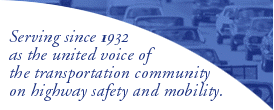| |
Highlights of The Highway Users' Efforts in 2002
On Behalf of the Highway Community
Tax
Revenues
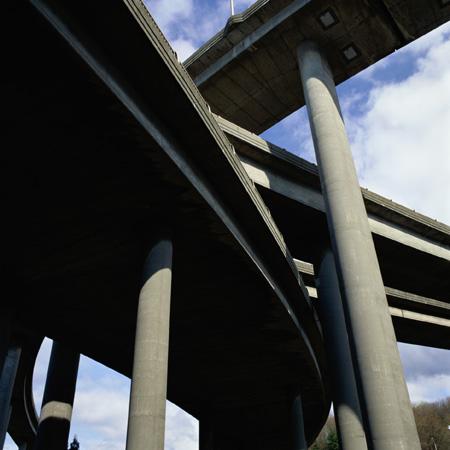 When U.S. Department of Transportation (DOT) Secretary
Mineta told a Senate committee in January that lower tax revenues to
the Highway Trust Fund would result in a 29% reduction in federal
highway funding for fiscal year 2003 –The Highway Users launched an
aggressive effort. We... When U.S. Department of Transportation (DOT) Secretary
Mineta told a Senate committee in January that lower tax revenues to
the Highway Trust Fund would result in a 29% reduction in federal
highway funding for fiscal year 2003 –The Highway Users launched an
aggressive effort. We...
- Testified in the
House and Senate for additional funds;
- Sent letters to
President Bush and Congress for increased highway investments;
- Urged 346
organizations to sign our letter to Congress to prevent the
shortfall; and
- Sponsored a highway
financing seminar with transportation appropriations subcommittee
Chairman Rogers (R-KY).
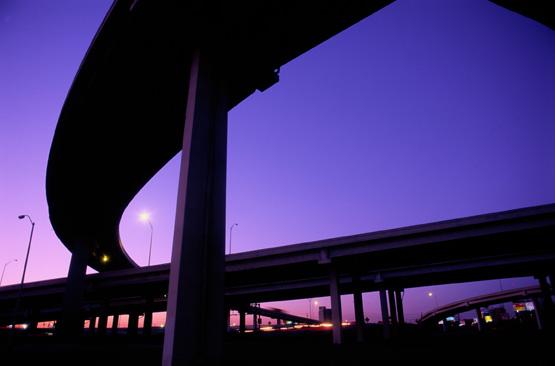 Highway Funding Highway Funding
Reauthorization
To
set the groundwork for reauthorization in 2003, we...
- Briefed key Members
of Congress and staff on our priorities;
- Outlined the
priorities in congressional testimony;
- Discussed the issues
with U.S. DOT Secretary Norman Mineta and Federal Highway
Administration (FHWA) Chief Mary Peters;
- Met with
representatives of the National Governors' Association, the
National Conference of State Legislatures; and
- Sponsored a seminar,
on September 24, 2002 "Where the Rubber Meets the Road," to get
state and local perspectives on reauthorization.
Fuel Tax
Evasion Schemes
 In addition to supporting increasing highway
investments, The Highway Users is among those who "stand watch" over
the Highway Trust Fund – that's why closing loopholes that allow the
proliferation of fuel tax evasion schemes could net an additional
$3-$4 billion a year in revenues to the Highway Trust Fund. In addition to supporting increasing highway
investments, The Highway Users is among those who "stand watch" over
the Highway Trust Fund – that's why closing loopholes that allow the
proliferation of fuel tax evasion schemes could net an additional
$3-$4 billion a year in revenues to the Highway Trust Fund.
- The estimates were
made by experts who presented their findings in a meeting hosted
by The Highway Users. Representatives of more than a dozen private
sector and government agencies attended the briefing.
- We also discussed
the issue with U.S. DOT Secretary Mineta and cited fuel tax
evasion in congressional testimony.
Environmental Issues
Ethanol
in Motor Fuels
 When a proposal to triple the use of ethanol
in motor fuels was introduced as part of a Senate national energy
bill (S. 1766), we... When a proposal to triple the use of ethanol
in motor fuels was introduced as part of a Senate national energy
bill (S. 1766), we...
- Signed a joint
letter from industry and labor organizations, saying the mandate
"literally will cost millions in lost revenue to the Highway Trust
Fund." Since ethanol-blended fuel is taxed at a lower rate than
regular gasoline, the legislation would result in a Highway Trust
Fund revenue loss of almost $3 billion per year by 2012.
- Worked with Sen.
Baucus (D-MT) and his staff to support his MEGA Trust Act (S.
2678) to increase funding for highways without raising taxes. The
bill also has the potential to increase funding to the Highway
Account by $2.7 billion and reclaiming the revenues from ethanol
taxes and subsidies for highways.
- Supported more
highway investments with grassroots and media efforts, including
op-eds and a Wall Street Journal editorial. To view all
Highway Users media efforts, check out our press
releases.
Fuel
Economy
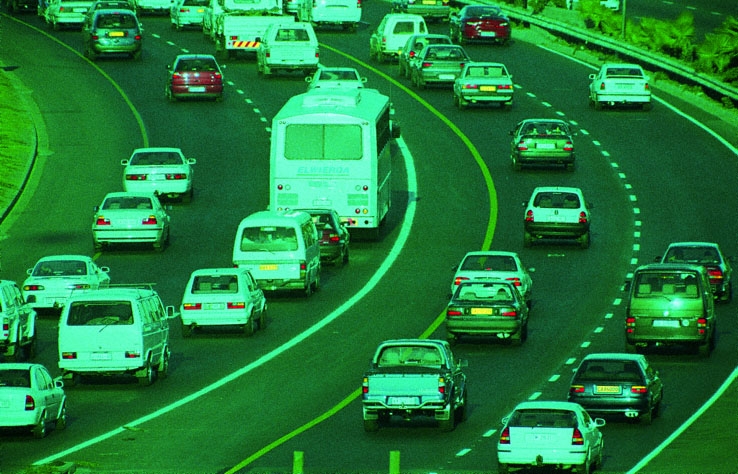 We strongly opposed the Kerry-Hollings Corporate Average
Fuel Economy (CAFÉ) standards in the Energy Policy Act of 2002
(S.517). The proposal would have raised average CAFÉ standards to 35
mpg by 2013, from the current 20.7 mpg for light trucks and SUVs and
27.5 mpg for cars. We... We strongly opposed the Kerry-Hollings Corporate Average
Fuel Economy (CAFÉ) standards in the Energy Policy Act of 2002
(S.517). The proposal would have raised average CAFÉ standards to 35
mpg by 2013, from the current 20.7 mpg for light trucks and SUVs and
27.5 mpg for cars. We...
- Wrote to each member
of the U.S. Senate, saying, "There are far better ways to improve
fuel economy for all vehicles than arbitrarily raising CAFÉ
standards. A good start would be to enact measures relieving the
stifling traffic congestion that is choking our nation's highways"
- Working through an
auto-maker led coalition, we used our extensive media and
grassroots contacts to help defeat Kerry-Hollings 62-38. Instead,
the Senate adopted a substitute provision requiring the U.S.
Department of Transportation to write new fuel economy rules
within two years.
Greenhouse Gases
 The Highway Users and the California Highway Users
Conference were part of another auto-led coalition to oppose onerous
state legislation in Sacramento. A California Assembly Bill (AB 1058
and later AB 1493) gave the state Air Resources Board virtually
unlimited authority to regulate greenhouse gases and allow the board
to impose restrictions, taxes, fees and reduced speed limits on
drivers and their vehicles. We... The Highway Users and the California Highway Users
Conference were part of another auto-led coalition to oppose onerous
state legislation in Sacramento. A California Assembly Bill (AB 1058
and later AB 1493) gave the state Air Resources Board virtually
unlimited authority to regulate greenhouse gases and allow the board
to impose restrictions, taxes, fees and reduced speed limits on
drivers and their vehicles. We...
- Testified against
the bill in the Senate Environmental Quality Committee on April 1,
2002;
- Discussed our
opposition to the proposal with California reporters;
- Brought the bill to
the attention of various groups; and
- Finally, urged Gov.
Gray Davis (D) to veto the measure.
Air
Quality & Energy Consumption

In January
2002 the Foundation for
Clean Air Progress (FCAP) released a study analyzing federal
government data collected since 1970 that revealed dramatic U.S. air
quality improvements even as the nation experienced an equally
dramatic rise in energy consumption. The study, entitled Breathing
Easier About Energy: A Healthy Economy and Healthier Air,
tracked air quality gains and energy consumption during the 30-year
period from 1970-1999 and showed a 43% drop in Clean Air Act
pollutants while overall national energy consumption grew 41%. FCAP
was chartered by The Highway Users.
Quality
Growth Campaign
An ongoing
issue in 2002 was our Quality Growth Campaign. We continued to
testify in Congress that our national behavior requires more road
capacity to meet our demands for safe, uncongested roads and
personal mobility.
Streamlining the
Environmental Review Process

One of the
ways to expand road capacity on a timely basis is to streamline the
project planning process for highways and transit while maintaining
environmental protection and public involvement.
- On October 8, 2002,
we testified before the U.S. House Transportation &
Infrastructure (T&I) Highways and Transit Subcommittee in
support of T&I Committee Chair Don Young's (R-AK) ExPDITE Act
(H.R. 5455).
- We also sent letters
to President Bush and Secretary Mineta after the President issued
an Executive Order that would require interagency cooperation and
expeditious document processing for significant highway projects.
Senator Baucus also introduced the Senate streamlining
legislation, MEGA Stream (S. 3031).
Guide to
Highway Issues
 To get 2002 congressional candidates
thinking about key highway and transportation issues, including
reauthorization of TEA 21, which expires in 2003, The Highway Users
and other groups developed and distributed, "The Road to
Congress." The binders, improved and better designed than the
1996 version, were sponsored jointly by The Highway Users,
Associated General Contractors, the Association of Equipment
Manufacturers and the National Sand, Stone and Gravel Association.
Thanks to an all-out effort by our members and other grassroots
supporters, the binders was delivered virtually to every Member of
Congress and other candidates for major and federal states offices. To get 2002 congressional candidates
thinking about key highway and transportation issues, including
reauthorization of TEA 21, which expires in 2003, The Highway Users
and other groups developed and distributed, "The Road to
Congress." The binders, improved and better designed than the
1996 version, were sponsored jointly by The Highway Users,
Associated General Contractors, the Association of Equipment
Manufacturers and the National Sand, Stone and Gravel Association.
Thanks to an all-out effort by our members and other grassroots
supporters, the binders was delivered virtually to every Member of
Congress and other candidates for major and federal states offices.
Roadway
Safety
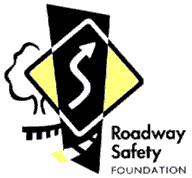 To support efforts by the Roadway Safety Foundation
to reduce fatalities caused by the physical characteristics of
roadways, The Highway Users provided staff support to RSF, a
501(c)(6) organization it chartered in 1987. See list of
RSF Activities in 2002. To support efforts by the Roadway Safety Foundation
to reduce fatalities caused by the physical characteristics of
roadways, The Highway Users provided staff support to RSF, a
501(c)(6) organization it chartered in 1987. See list of
RSF Activities in 2002.
Keeping
Members Informed
As a
resource to the highway community about transportation issues that
impact mobility and safety, The Highway Users published a wide range
of member communications to keep members informed about efforts on
their behalf and relevant trends and developments. This includes the
weekly Rules of the Road; the monthly Action Update; a
quarterly online newsletter, America's Highways; and
Legislative Alerts and Legislative Updates, as issues
warrant.
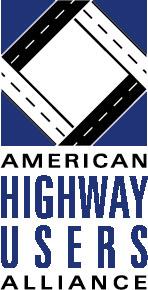
American Highway Users Alliance
1776 Massachusetts
Avenue, NW, Suite 500, Washington, DC 20036
(P) 202.857-1200 |
(F) 202-857-1220
http://www.highways.org/
|


